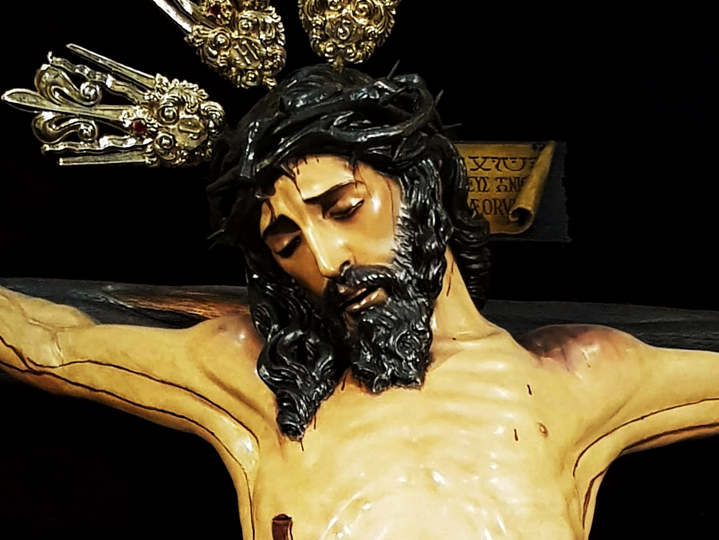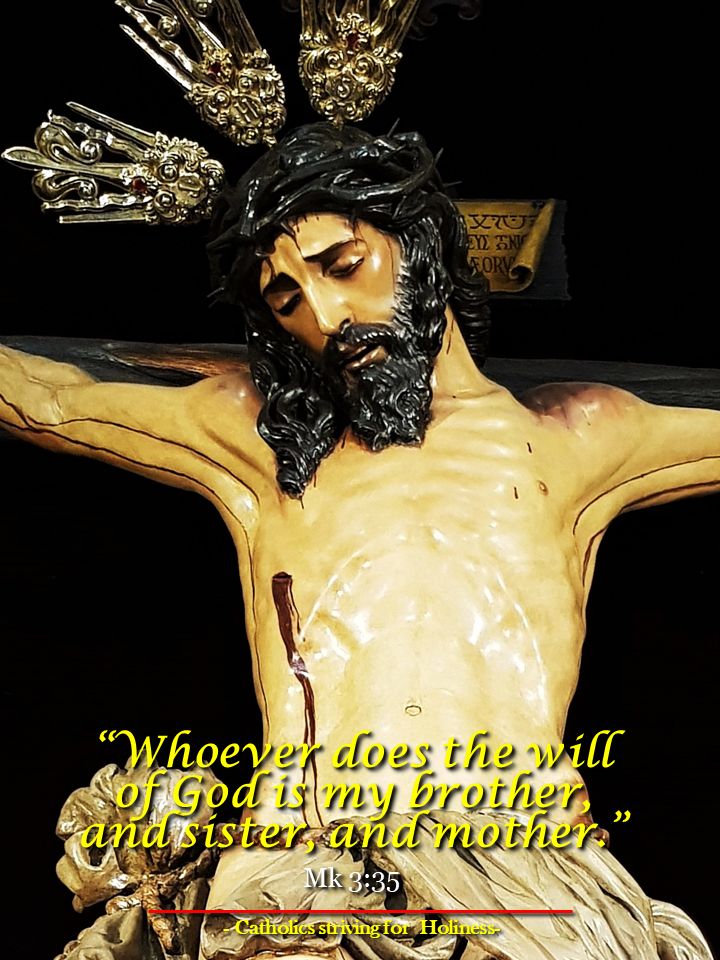

10th Sunday of Ordinary Time Year B
THE TRUE BRETHREN OF OUR LORD JESUS CHRIST
Today’s 10th Sunday of Ordinary time year B Gospel, taken from Mk 3:20-35, teaches us the following important ideas:
- Jesus’ immense love for souls
- The devil really exists.
- Jesus is far stronger than the devil because He is True God.
- To attribute to the devil the good works of God is a sin against the Holy Spirit, a blasphemy.
- The true brethren of Our Lord Jesus Christ
1. Jesus’ immense love for souls
In vv. 20-21, some of his relatives, whose outlook was too human, regarded Jesus’ total commitment to apostolate as excessive: the only explanation, they thought, was that he was out of his mind.
- On reading these words of the Gospel, we cannot help being moved, realizing what Jesus did for love for us: people even thought him mad.
- Many saints, following Christ’s example, have been taken for madmen — but they were mad with love, mad with love for Jesus Christ.
2. The devil really exists.
In vv. 22-23, Jesus’ miracles were misunderstood by these scribes, who accuse him of being a tool of the prince of devils, Beelzebul.
- This name may be connected with Beelzebub (which spelling is given in some codexes), the name of a god of the Philistine city of Eqron (Accaron), which means “god of the flies.” But is more likely that the prince of devils is called Beelzebul, which means “god of excrement”: “excrement” is the word the Jews used to describe pagan sacrifices.
- Whether Beelzebub or Beelzebul, in the last analysis it refers to him to whom these sacrifices were offered, the devil (1 Cor 10:20). He is the same mysterious but real person whom Jesus calls Satan, which means “the enemy”, whose dominion over the world Christ has come to wrest (I Cor 15:24-28; Col 1:130 in an increasing struggle (Mt 4:1-10; Jn 16:11).
- These names show us that the devil really exists: he is a real person who has at his beck and call others of his kind (Mk 5:9).
3. Jesus is far stronger than the devil because He is True God.
In verses 24-27, Our Lord invites the Pharisees, who are blind and obstinate, to think along these lines: if someone expels the devil this means that he is stronger than the devil:
- once more we are exhorted to recognize in Jesus the God of strength, the God who uses his power to free man from enslavement to the devil. Satan’s dominion has come to an end: the prince of this world is about to be cast out.
- Jesus’ victory over the power of darkness, which is completed by his Death and Resurrection, shows that the light has already entered the world, as our Lord himself told us: “Now is the judgment of this world, now shall the ruler of this world be cast out; and I, when I am lifted up from the earth, will draw all men to myself” (Jn 12:31-32).
4. To attribute to the devil the good works of God is a sin against the Holy Spirit, a blasphemy.
In verses 28-30, Jesus has just worked a miracle but the scribes refuse to recognize it “for they had said ‘He has an unclean spirit” (v. 30).
- They do not want to admit that God is the author of the miracle. In this attitude lies the special gravity of blasphemy against the Holy Spirit — attributing to the prince of evil, to Satan, the good works performed by God himself.
- Anyone acting in this way will become like the sick person who has so lost confidence in the doctor that he rejects him as if an enemy and regards as poison the medicine that can save his life.
- That is why our Lord says that he who blasphemes against the Holy Spirit will not be forgiven: not because God cannot forgive all sins, but because that person, in his blindness towards God, rejects Jesus Christ, his teaching and his miracles, and despises the graces of the Holy Spirit as if they were designed to trap him (cf. St Pius V. Catechism of the Council of Trent, , II, 5, 19; St Thomas Aquinas, Summa theologiae, II-Il, q.14, a.3). Cf. note on Mt 12:31-32.
5. The true brethren of Our Lord Jesus Christ
Verses 31-35: In Aramaic, the language used by the Jews, the word “brethren” is a broad term indicating kinship: nephews, first cousins and relatives in general are called ‘brethren’ (for further explanation cf. note on Mk 6:1-3). “Jesus did not say this to disown his mother, but to show that she is worthy of honour not only on account having given birth to Jesus, but also because she has all the virtues” (Theonhilactus, Enarratio in Evangelium Marci, in loc.).
- Therefore, the Church reminds us that the Blessed Virgin “in the course of her Son’s preaching received the words whereby, in extolling a kingdom beyond the concerns and ties of flesh and blood, he declared blessed those who heard and kept the word of God as she was faithfully doing” (Vatican II, Lumen gentium, 58).
- Our Lord, then, is also telling us that if we follow him we will share his life more intimately than if we were a member of his family.
- St Thomas explains this by saying that Christ “had an eternal generation and a generation in time, and gave preference to the former. Those who do the will of the Father reach him by heavenly generation… Everyone who does the will of the Father, that is to say, who obeys him, is a brother or sister of Christ, because he is like Him who fulfilled the will of his Father. But he who not only obeys but converts others, begets Christ in them, and thus becomes like the Mother of Christ” (Commentary on St Matthew, 12, 49-50).
SOURCE: NAVARRE BIBLE, COMMENTARY ON THE GOSPEL OF ST. MARK
Stay updated: subscribe by email for free TO OUR NEW WEBSITE catholicsstrivingforholiness.org (PUT YOUR EMAIL IN THE SUBSCRIBE WIDGET).
If you need some resources regarding a particular topic, feel free to use the search WIDGET which has access to thousands of posts, categories and tags on Catholic spirituality.
Cordially inviting you as well to follow www.fb.com/Catholicsstrivingforholiness. and share our posts to help more people in their Christian faith and life.
Thanks and God bless you and your loved ones! Fr. Rolly Arjonillo.